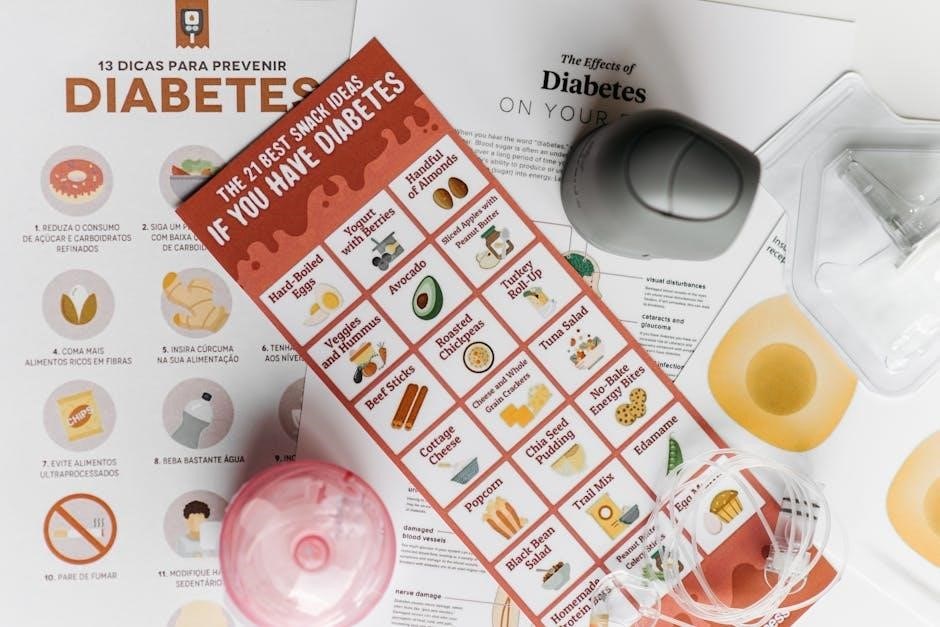The Michigan WIC Food Guide provides a comprehensive resource for participants, outlining eligibility criteria, approved food lists, and program benefits. Available in multiple languages, it ensures accessibility and understanding. The guide also features tools like the Michigan WIC Connect Mobile App, helping recipients manage benefits and locate authorized stores efficiently.
Overview of the WIC Program in Michigan
The Michigan WIC Program is part of the federal Special Supplemental Nutrition Program for Women, Infants, and Children, designed to support low-income families. It serves pregnant, breastfeeding, and postpartum women, as well as infants and young children up to age five. The program provides nutrition education, breastfeeding support, and access to healthy foods to promote optimal health outcomes. Michigan WIC also offers resources like the Michigan WIC Connect Mobile App, which helps participants manage benefits and locate authorized stores. Recent updates, such as the 2023 federal income guideline increases, have expanded eligibility, allowing more families to access essential nutrition assistance. Additionally, initiatives like Project FRESH (now called WIC Produce Connection) enhance access to fresh fruits and vegetables, further supporting healthy eating habits. The program plays a critical role in addressing food insecurity and improving health outcomes for Michigan’s most vulnerable populations.
Importance of Nutritional Support for Women, Infants, and Children
Nutritional support is crucial for the health and development of women, infants, and children, particularly during critical growth periods. Proper nutrition helps prevent health disparities and ensures optimal physical and cognitive development; For pregnant and breastfeeding women, adequate nutrients support maternal health and infant growth. Infants and young children benefit from essential vitamins and minerals that foster healthy development. The Michigan WIC Program emphasizes access to nutrient-rich foods, such as fruits, vegetables, whole grains, and iron-fortified cereals, which are vital for growth and development. Additionally, the program provides education on healthy eating habits, empowering families to make informed choices. By addressing nutritional needs early, WIC helps reduce the risk of chronic diseases and supports long-term health outcomes, creating a foundation for a healthier future.

Eligibility and Income Guidelines for Michigan WIC
Eligibility for Michigan WIC requires meeting income guidelines and categorical criteria, such as pregnancy, breastfeeding, or having a child under five, while also addressing nutritional risks to ensure program benefits reach those in need.
2023 Federal Income Guidelines for WIC Participation
The 2023 federal income guidelines for Michigan WIC participation reflect a significant increase, effective June 1, 2023, allowing more families to qualify for benefits. These updated guidelines aim to expand access to nutritious food assistance for low-income families, ensuring that eligible women, infants, and children receive essential support. Christina Herring-Johnson, Michigan WIC director, emphasized the importance of these changes in addressing food insecurity and improving health outcomes. The new income thresholds enable more families to meet eligibility requirements, particularly those with larger household sizes. This adjustment aligns with the program’s mission to provide nutritional education and healthy food options to vulnerable populations. For detailed income limits, families can refer to the Michigan WIC Income Guidelines, which outline the specific eligibility criteria for participation in the program.
How to Qualify for Michigan WIC Benefits
To qualify for Michigan WIC benefits, applicants must meet specific eligibility criteria. These include being a Michigan resident, falling within the income guidelines, and belonging to one of the target categories: pregnant women, postpartum women, breastfeeding women, infants, or children under five. Additionally, applicants must have a nutritional need confirmed by a healthcare professional. Families already receiving Medicaid or Temporary Assistance for Needy Families (TANF) may automatically qualify. Documentation such as proof of identity, residency, and income is required during the application process. Applicants can apply online or visit their local WIC office for assistance. The program aims to support low-income families in accessing healthy foods and improving nutritional outcomes. For more details, visit the Michigan WIC website or contact a local WIC agency to determine eligibility and begin the enrollment process.

Authorized Foods and Products Under Michigan WIC
The Michigan WIC Food Guide outlines approved food categories, including infant formula, fruits, vegetables, whole grains, and protein sources. Examples include Gerber baby foods and purees, which meet FDA standards.
WIC-Approved Food Categories
The Michigan WIC Food Guide categorizes approved foods to ensure balanced nutrition for participants. These include infant formula, breastfeeding support products, and supplemental foods like fruits, vegetables, whole grains, and proteins. Gerber baby foods, such as purees and cereals, are also listed. Additionally, the guide specifies that all items must comply with FDA standards to guarantee safety and quality. The categories are designed to meet the nutritional needs of women, infants, and children, promoting healthy growth and development. Authorized foods are accessible at participating stores, and the WIC Connect App helps participants track and manage their benefits effectively. This structured approach ensures that recipients receive essential nutrients while adhering to program guidelines.
Special Formula and Food Requests in Michigan WIC
The Michigan WIC program accommodates special dietary needs by allowing requests for specific formulas and foods. Participants requiring special formulas, such as Similac, must submit a request form, often requiring a healthcare provider’s approval. Form DCH-1326, revised in June 2023, is used for such requests, ensuring proper documentation of medical necessity. The program collaborates with manufacturers like Abbott and the FDA to monitor product availability and safety. This process ensures that infants and children with special needs receive appropriate nutrition. Additionally, Michigan WIC works to address any supply issues, providing updates to participants. This tailored support ensures that all recipients, including those with unique dietary requirements, benefit from the program’s resources. The special request system reflects the program’s commitment to inclusivity and adaptability in meeting participants’ needs.

Resources and Tools for Michigan WIC Participants
Michigan WIC Connect Mobile App offers features to manage benefits and find authorized stores. The WIC Food Guide is available in multiple languages, ensuring accessibility and clear guidance for participants.
Michigan WIC Connect Mobile App Features
The Michigan WIC Connect Mobile App is a user-friendly tool designed to assist participants in managing their WIC benefits effectively. Key features include checking balance and transaction history, locating nearby WIC-authorized stores, and scanning barcodes to verify if items are eligible for purchase. The app also provides access to the WIC Food Guide, which lists all approved products, helping participants make informed choices. Additionally, it offers resources for nutritional education and breastfeeding support. Available in multiple languages, the app ensures that all participants can benefit from its features, regardless of their preferred language. Regular updates keep users informed about program changes, such as new food options or store locations. This app is an essential resource for maximizing the benefits of the Michigan WIC program.
WIC Food Guide Availability in Multiple Languages
The Michigan WIC Food Guide is available in multiple languages, including English, Spanish, and Arabic, to ensure accessibility for all participants. This inclusivity helps diverse families understand the program benefits and navigate the approved food options. The guide is accessible online and through the Michigan WIC Connect Mobile App, making it convenient for participants to access vital information anytime, anywhere. The availability of the guide in multiple languages reflects Michigan WIC’s commitment to serving all eligible families, regardless of their linguistic background. This approach ensures that everyone can fully utilize the program’s resources, promoting healthier outcomes for women, infants, and children statewide;

Recent Updates and Changes to the Michigan WIC Program
Recent updates include the 2024 rebranding of Project FRESH to WIC Produce Connection and 2023 income guideline increases to expand eligibility. Enhanced food options now include more fruits, vegetables, and whole grains, aligning with updated nutritional standards. The Michigan WIC Connect Mobile App has also been improved for better benefit management and user experience.
2024 Changes to Project FRESH (WIC Produce Connection)
In 2024, Project FRESH was rebranded as the WIC Produce Connection, enhancing access to fresh fruits and vegetables for Michigan WIC participants. This update aligns with efforts to promote healthier eating habits and support local agriculture. The program now provides additional resources to help families utilize their benefits effectively, including educational materials on meal planning and food preparation. The rebranding also emphasizes partnerships with local farmers and grocery stores to ensure a wider variety of fresh produce options. Participants can now access a broader selection of seasonal fruits and vegetables, making it easier to incorporate nutrient-rich foods into daily meals. These changes aim to improve the overall nutrition and health outcomes for women, infants, and children in Michigan. The Michigan WIC Food Guide has been updated to reflect these changes, ensuring participants stay informed about available benefits and resources.
Impact of Income Guideline Increases on Participation
The increase in 2023 federal income guidelines for the Michigan WIC program has significantly expanded eligibility, allowing more families to access essential nutritional benefits. This adjustment reflects the growing need for food assistance and aims to address disparities in access to healthy food options. As a result, participation rates have risen, with more pregnant women, new mothers, and young children benefiting from the program. The enhanced income thresholds ensure that low-income families, who might otherwise struggle to afford nutritious food, can now receive support. This expansion aligns with the program’s mission to improve health outcomes by providing access to wholesome foods and nutritional education. The increased participation underscores the critical role of WIC in addressing food insecurity and promoting the well-being of vulnerable populations in Michigan.
